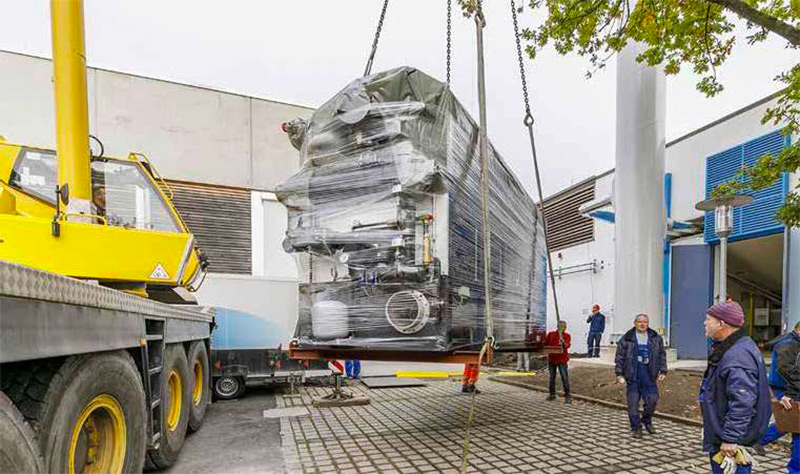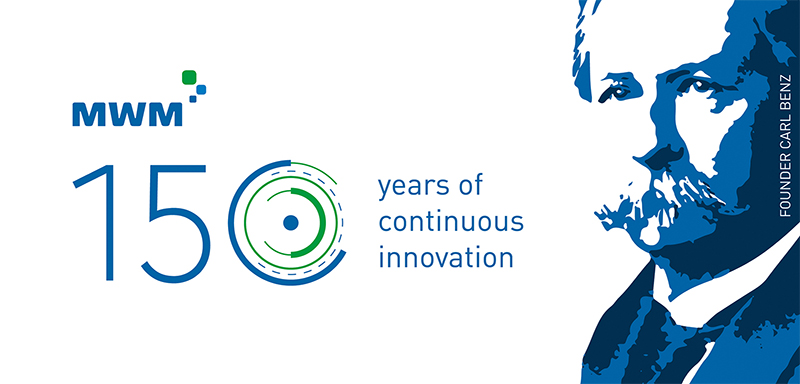Modernized MWM Cogeneration Power Plants for Ecological Botanical Garden of University of Bayreuth Designated as “Cogeneration Power Plant of the Month” of February
Mannheim, April 8, 2020
“Energie & Management” designated the two MWM cogeneration plants of the University of Bayreuth, which have been converted for permanent operation, as “Cogeneration Power Plant of the Month” of February. On the university campus in Bayreuth, the modernized cogeneration plants are no longer responsible solely for the emergency power supply of the Ecological Botanical Garden, but are now also connected to the heat grid. The new combined heat and power (CHP) plant in the Heat and Cooling Center South went live at the end of 2019.
More Efficient and Cost-Efficient Through Expansion and Modernization of Cogeneration Power Plants
The on-campus CHP plant is operated by Stadtwerke Bayreuth Energie und Wasser GmbH. The Ecological Botanical Garden of the University of Bayreuth depends on 100-percent emergency heat supply. On a total of 6,000 m², the garden’s air-conditioned greenhouses host approximately 12,000 kinds of plants and serve educational and recreational purposes. There are two Heat and Cooling Centers on the premises. The emergency heat supply that serves the protection of the plants, which are sensitive to cold, is based in the Heat and Cooling Center South. For the modernization of the old plant technology, the Heat and Cooling Center South and the emergency heat supply grid were overhauled. Additionally, a connection was established to the Heat and Cooling Center North in order to enable more efficient and inexpensive operation of the campus grid.
Conversion to Permanent Cogeneration Increases Energy Efficiency and Energy Security for Botanical Garden and Campus of the University of Bayreuth
Apart from the two Deutz-MWM G604BV12E gas engines with a total output of 960 kWel, which were overhauled after almost 30 years of operation, a new power-to-heat plant and a natural gas peak load boiler were installed. This ensures the heat supply of the Ecological Botanical Garden of the University of Bayreuth in the event of a failure of one of the cogeneration power plants. In addition to the conversion of the gas engines, the hydraulic integration in the heat network was modified. The engines provide combined heat and power (CHP) generation. Thanks to the modernization, the exhaust heat can be collected with the help of heat exchangers and be directly fed into the local heat grid of the University of Bayreuth. Prior to the conversion, both the cogeneration power plants and the power-to-heat plant were used exclusively in standalone mode for the emergency supply of the garden. Thus, the plant had to be kept on stand-by throughout the year although it only used to be operated in test mode for a few hours. Through the modernization, the operating time of the MWM cogeneration plants now goes up to about 4,300 hours/year, resulting in a significant increase in the energy efficiency of the CHP plant.

Delivery of the overhauled gas engines, which will henceforth continually supply cogenerated heat and power (Photograph: Stadtwerke Bayreuth Energie und Wasser GmbH)
Feed-in to the Heat Network and Carbon Savings of 1,150 t/Year
The conversion of the electrical and hydraulic connection to the two MWM cogeneration power plants now enables the emergency power supply of the Ecological Botanical Garden and the permanent feed-in of heat to the university’s grid. “The CHP feed-in tariff and the internal power privilege for overhauled existing plants ensure economic operation of the emergency supply”, says Thomas Gollwitzer of the Institute for Energy Technology at the University of Applied Sciences Amberg-Weiden. As the existing plant has been overhauled without increasing the output of the cogeneration power plants, the generated power can be used internally in the Heat and Cooling Center with reduced EEG levy. The power fed into the public grid is subject to a feed-in tariff pursuant to the German Combined Heat and Power Act (KWKG). The workload of the natural gas boiler in the Heat and Cooling Center North has been reduced, and heat can be fed into the university’s heat grid. Through the conversion of the campus grid to this more efficient and cost-optimized operating mode, the University of Bayreuth also saves up to 1,150 t of carbon a year. In addition to improved security of supply, the cogeneration power plants thus make a sustainable contribution to the “Green Campus Initiative” of the University of Bayreuth, which promotes climate protection through greenhouse gas neutrality by 2030 and effective protection of resources.
Highly Efficient, Customer-Specific MWM Power Plant Solutions
With almost 150 years of experience in the development and optimization of gas engines for natural gas, biogas, and special gases, MWM delivers highly efficient, eco-friendly combined heat and power (CHP) plants/cogeneration power plants for distributed energy generation. MWM cogeneration power plants enable economic, efficient energy generation. The power generated by the cogeneration power plants can be consumed on site or be fed into the public grid for a feed-in tariff.
Further information:
- “Energie & Management”, February 2020: “Weg vom reinen Inselbetrieb” (PDF in German)
- MWM Cogeneration Power Plant Solutions
- MWM Energy Solutions for Greenhouses
- MWM Press release: MWM Flex Cogeneration Power Plant for Biogas Plant in Lower Saxony Designated “Cogeneration Power Plant of the Month” of January
- MWM Press release: Improved Performance through Cogeneration Power Plant Engine Replacement: Energieversorgung Nordhausen Installs Four MWM TCG 2020 V20 Gas Engines
- MWM Press release: MWM TCG 2020 Gas Engines for Schleswiger Stadtwerke Raise Cogeneration Power Plant Efficiency to More Than 90 Percent
Contact Media
Aljoscha Kertesz
Manager Communications
T +49 621 48 18 35 76
E mwm-press@cat.com
Frank Fuhrmann
Online Editor
Member of DPV / German Press Association
T +49 621 48 18 35 16
E mwm-press@cat.com










































